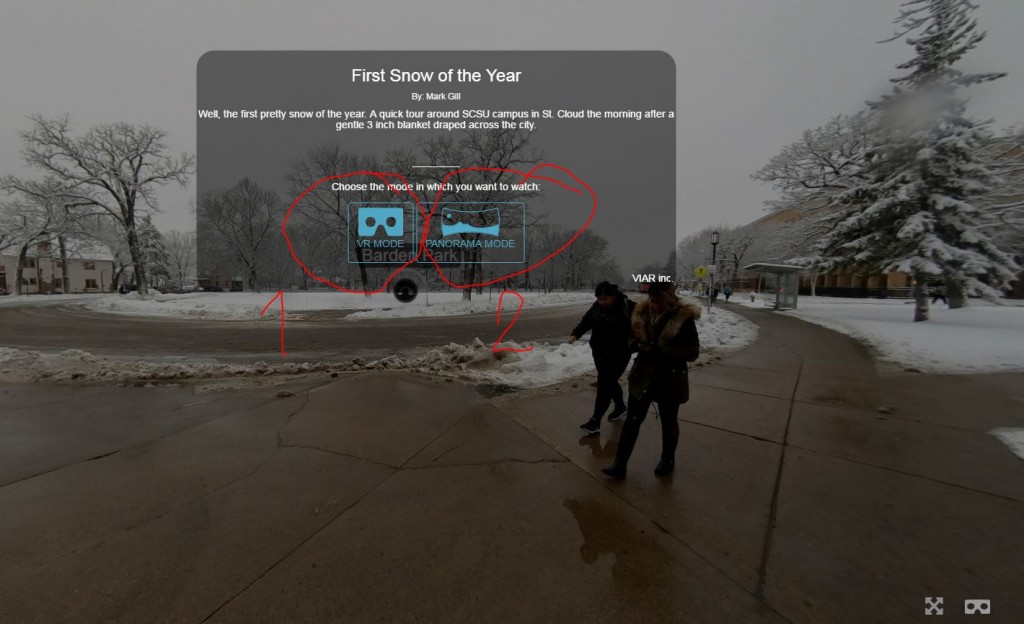Well, technically not the first for 2016, but certainly beautiful:
Best experience with VR goggles: Google Cardbox, HTC Vive etc. (please ask for more info if needed). If you have goggles, choose “VR Mode” (1), if viewing on your computing device (desktop, laptop, smart phone, tablet) and/or don’t have goggles, choose “Panorama Mode” (2)

Save
If you would like to brainstorm ideas to apply Virtual Reality, Augmented Reality and/or 360 video in your courses, please let us know…




https://www.pinterest.com/pin/487585097129364790

++++++++++++++++
more on effective presentations in this IMS blog:
https://blog.stcloudstate.edu/ims?s=presentations
more on social media and technology in this Pinterest boards:
https://www.pinterest.com/aidedza/tech-related-stuff/
https://www.pinterest.com/aidedza/social-media/
Save


++++++++++++++++
more on effective presentations in this IMS blog:
https://blog.stcloudstate.edu/ims?s=presentations
10 Social Media Apps You Should Be Using in 2016 (But Probably Aren’t)
The Roll app will help you make sure your images are the best they can be. The Roll analyzes your photos, rates them on a zero to 100 scale, and adds keywords for easy search (much like Google Photos).
The Roll has more features than I have time to write about it here. Just do yourself a favor and check it out. Your visual content will thank you.
Download The Roll for iPhone
Tuurnt is a social media app and platform following in the ephemeral footsteps of Snapchat. Giving users 24 hours to respond to photos and videos, Tuurnt turns regular visual posts into social events where participation and contribution from both known contacts and public users is encouraged.
The app allows you to take photos and videos from your phone’s camera roll (or from Instagram, Flickr, and Dropbox) to create a shareable “story.”
Yubl’s success can be attributed to not only the highly detailed interface, but the three main areas of the user experience. “Private” is for one-on-one or invite-only group, ‘Public’ is an open forum across the entire social network (including brands and celebrities), and ‘Explore’ is for searching and finding other users such as brands and celebrities.
share your favorite movies, music, books, TV shows, videos, restaurants, bars, travel destinations, and anything else you like.
plan your trips, acts as a guide, encourages you to capture moments along the way, and then ‘relive’ your experiences.
Download Firef.ly for iPhone
send and receive money free of charge, transfer to your bank, and checkout on other apps with just one touch.
Create, delete, and manage contact groups for easy, quick communication with teams, friends, and family. iOS only
Quik allows users to create stylized videos with just a few taps on their mobile devices. Once your video is done, you can post directly to your social media accounts through Quik.
my note. compare Quik to other video editing free tools for mobiles: https://blog.stcloudstate.edu/ims/2016/01/21/video-editing-for-mobile-devices/
The app bridges the gap between your phone and computer, and, as Gizmodo explains, “automatically sends all your phone notifications over to your computer in the form of little windows.
How To Use The App That Will Make Your Photos Look So Much Better
http://www.businessinsider.com/how-to-use-vsco-cam-2015-1?op=1#ixzz3OeN3Fss0
VSCO Cam available for mobile devices
VSCO Cam allows users to transform bland photos into gallery-worthy artistic images.
https://comminfo.rutgers.edu/~tefko/Courses/e553/Readings/Mackey%20Metalitreacy%20CLR%202011.pdf
https://crl.acrl.org/index.php/crl/article/view/16132
https://pdfs.semanticscholar.org/6d77/5e0711644fad14b8abb22314fb19b9c79bca.pdf
p. 62
Metaliteracy promotes critical thinking and collaboration in a digital age, providing a comprehensive framework to effectively participate in social media and online communities.
Metaliteracy challenges traditional skills-based approaches to information literacy by recognizing related literacy types and incorporating emerging technologies. Standard definitions of information literacy are insufficient for the revolutionary social technologies currently prevalent online.
Information literacy was the term used most frequently in the United States from the late 1980s through most of the 1990s and is still used regularly. (Craig Gibson, “Information Literacy and IT Fluency: Convergences and Divergences,” Reference & User Services Quarterly 46, no. 3 (2007): 24.)
p. 64. Social media and online collaborative communities are not specifically addressed in the standard definitions, but many of the highlighted skills are pertinent to today’s information environment.
…these institutional frameworks are not on the cutting edge of emerging trends; they lag behind the innovations of Web 2.0 and social media. Metaliteracy expands the scope of information literacy as more
than a set of discrete skills, challenging us to rethink information literacy as active knowledge production and distribution in collaborative online communities.
Media Literacy,
Digital Literacy,
Visual Literacy,
Cyberliteracy,
Information Fluency,
Metaliteracy
p. 69. While new literacy movements have similar foundation elements to information literacy, specifically
related to critical reading and critical thinking, as well as proficiencies in finding, synthesizing, and creating information, differences are often emphasized based on the specificity of technology or media
formats. As each new form of literacy is introduced, the shared literacy goals related to critical thinking and information skills are often overlooked, creating an unnecessary divide between information literacy
and other literacy types. The information literacy literature has also contributed to this separation in an effort to clarify important distinctions between information and computer skills, or between traditional
bibliographic instruction and new media literacy. Metaliteracy reinforces stronger
connections between information literacy and other literacy frameworks. This approach looks at the foundation principles that unite information and technology, rather than focusing on differences based
on discrete skills, distinct technologies, or media formats.
x-literacies
Jon Dron’s blog
https://landing.athabascau.ca/blog/view/708453/x-literacies
Computer literacy
Internet literacy
Digital literacy
Information literacy
Network literacy
Technology literacy
Critical literacy
Health literacy
Ecological literacy
Systems literacy
Statistical literacy
New literacies
Multimedia literacy
Media literacy
Visual literacy
Music literacy
Spatial literacy
Physical literacy
Legal literacy
Scientific literacy
Transliteracy
Multiliteracy
Metamedia literacy









